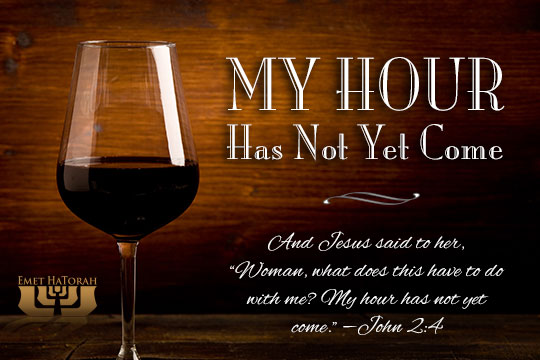My Hour Has Not Yet Come
Series:

When the wine ran out, the mother of Jesus said to him, "They have no wine." And Jesus said to her, "Woman, what does this have to do with me? My hour has not yet come." (John 2:3-4)
In our culture, to begin a response to one's mother with "Woman," is extremely disrespectful. Why would Yeshua respond to his mother this way? In ancient Middle Eastern terms, this expression was not as harsh as it sounds to us today. It would actually have been an affectionate term of endearment. This is why several translations render it as "Dear woman" or simply as "Mother."
But what did Yeshua mean when he said, "What does this have to do with me? My hour has not yet come"? Didn't he come to reveal himself to the world? Didn't he begin doing miracles from this point forward? Why, then, did he seem to imply that he wasn't interested in helping out? Why did he say that his hour had not yet come?
According to Jewish expectation, the future Messianic Era is a time in which all things will be made right, the King of Israel will reign from Jerusalem, the Torah will go forth to all the world, and there will be abundance in all things. The abundance of wine in particular is a prominent symbol of the Messianic Era:
The Holy One, blessed be He, will prepare a feast for the righteous in the Garden of Eden... He will therefore in the hereafter give them to drink of the wine that is preserved in its grapes since the six days of Creation. (Numbers Rabbah 13:2)
Yeshua and his disciples were very familiar with this concept. Just a few verses before we read of Yeshua and his disciples attending the wedding at Cana, we read about the calling of Nathanael (Bartholomew). When Philip brought Nathanael to Yeshua, Yeshua told him, "When you were under the fig tree, I saw you" (John 1:48). Immediately, Nathanael recognized him as the Messiah. He responded, "Rabbi, you are the Son of God! You are the King of Israel!" Why did this speak to Nathanael's heart? Because sitting under the fig tree is symbolic of the Messianic Era (1 Kings 4:25; Micah 4:4; Zechariah 3:10). Yeshua spoke to him in Messianic terms that Nathanael understood, hinting to Nathanael that his messianic expectations would one day be realized through him.
According to Papias of Hierapolis (70-163CE), a chronicler of Yeshua's teachings whose works have been almost entirely lost, Yeshua taught his disciples about the Messianic Era in even more vivid terms:
The days will come in which vines shall grow, having each ten thousand branches, and in each branch ten thousand twigs, and in each true twig ten thousand shoots, and in every one of the shoots ten thousand clusters, and on every one of the clusters ten thousand grapes, and every grape when pressed will give twenty-five measures of wine. And when any one of the righteous will take hold of a cluster, another will cry out, 'I am a better cluster, take me; bless the Lord through me.' (Fragments of Papias IV)
This lost teaching from Yeshua about the Messianic Era applies directly to our understanding of Yeshua's actions in our narrative. His mother knew that Yeshua was the promised Messiah of Israel. She also knew that when the Messiah arrived, there would be no shortage of wine, especially in regard to such a joyous occasion as a wedding. When she heard the wine was depleted at the wedding she naturally turned to Yeshua in hopes that his first act of beginning the restoration of the Kingdom would be to fill the wine vats to overflowing. Realizing the implications of her prompting, Yeshua gently helped her understand that the hour of restoration was not at hand. He said, "What does this have to do with me? The time of my Kingdom has not yet come."
However, he did not leave it at that. He desired to fulfill the mitzvah of providing for a bride, particularly in her hour of need, and thus turned the six stone vessels of water into some of the best wine anyone has ever tasted this side of paradise. And although the bride, the groom and most of the guests did not realize the significance of what just happened, his disciples took careful note:
This, the first of his signs, Jesus did at Cana in Galilee, and manifested his glory. And his disciples believed in him. (John 2:11)
This demonstration of Yeshua's connection to the Messianic Kingdom became a milestone for his disciples that they would forever remember, endearing them to the true King of Israel throughout the remainder of their lives. They had tasted the wine of the Messianic Era and could never forget the sweet foretaste that lingered on their lips. Thus, they each picked up their Master's prophetic cry of "Repent! For the Kingdom of Heaven is at hand!" and with the wine of the Kingdom filling their souls they began to turn the world on its head.








